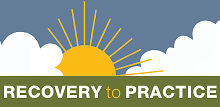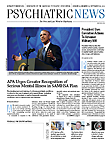In August, APA launched the website of Recovery to Practice (RTP), an online continuing medical education course centered on recovery-oriented care.
“There has been a push for transformation of our behavioral health care system to become a more person-centered kind of care,” commented Wesley Sowers, M.D., director of the Center for Public Service Psychiatry at Western Psychiatric Institute and Clinic in Pittsburgh and a member of the RTP curriculum advisory committee. “This new project,” he explained to Psychiatric News, “will allow patients to take control of their lives and have a directive roll in recovery.”
The course was co-developed by APA and the American Association of Community Psychiatrists to equip psychiatrists and other mental health care providers with the “knowledge and tools to provide care in a manner that respects the person, engages them as an active participant in decision making, and engenders hope in achieving their goals,” according the course description.
The RTP consists of nine modules, each ranging from 20 to 40 minutes, that address specific aspects of recovery-oriented practice via narrated slides, video clips from experts, and case vignettes. APA designates a maximum of 1 AMA PRA Category 1 credit per module. These are the module:
Introduction to Recovery-Oriented Care
Engagement and Welcoming Environment
Person-Centered Planning and Shared Decision Making
Peer Supports in Recovery
Health- and Wellness-Focused Care
Developing Living Skills and Natural Supports
Culturally Appropriate Care
Though there has been much focus on the biological and technical aspects of treatment for mental disorders over the past decade, Sowers said that once implemented in practice, the principles learned from the RTP course will show that the “human” aspects of treatment are just as important in healing as treatments that may be considered more “advanced.”
The course can help psychiatrists develop “better and deeper relationships” with patients, Sowers stressed. “By engaging with [patients] in a humanistic way, we will recognize their potential for growth and getting back to a satisfying and productive life.”
Funding for the course was provided by the Substance Abuse and Mental Health Services Administration’s Recovery to Practice Initiative, which awarded five-year contracts, each valued at $350,000, to six national mental health organizations “to develop and implement training curricula that promote greater awareness, acceptance, and adoption of mental health recovery principles and practices among mental health providers.” ■
The Recovery-Oriented Care in Psychiatry course can be accessed
here. Enroll now in 9 part series to provide psychiatrists with a basic understanding of recovery from mental illness and substance use disorders.

